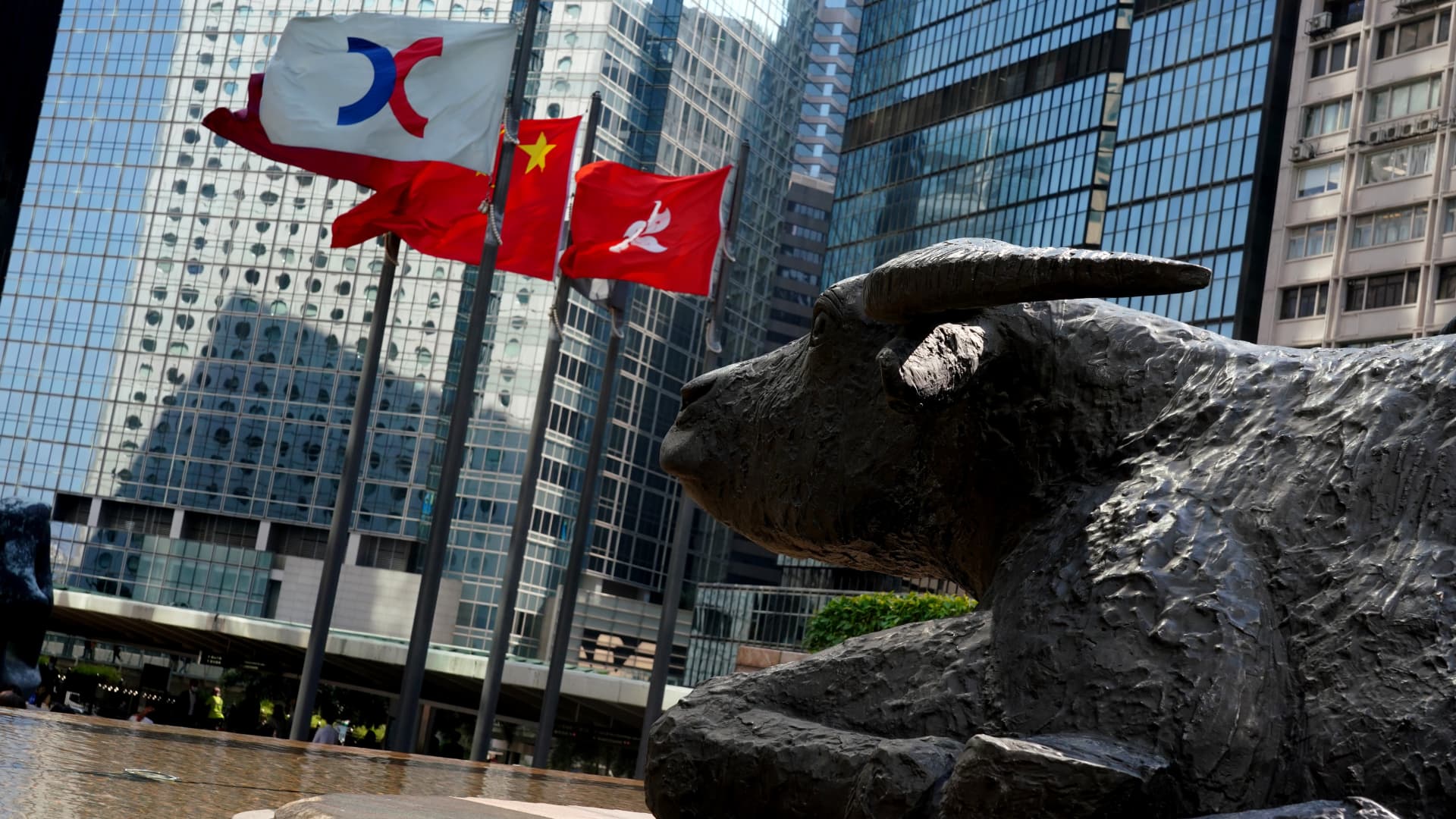Hong Kong stocks rise 2%; China’s exports see first annual drop since May 2020

Rising interest rates and food inflation are headwinds for Indian economy
The two risks that the Indian economy will face in 2023 are inflation and rising interest rates, the chairman of the State Bank of India Dinesh Kumar Khara told CNBC’s “Squawk Box Asia” on Monday.
There is a risk that India and other economies would have to keep pushing up its interest rates when central banks such as the U.S. Federal Reserve do, Khara said.
Food inflation is also a challenge as India “imports a significant proportion of its food requirements”, Khara added.
— Su-Lin Tan
U.S. midterms will not have ‘direct, immediate impact’ on China: Morgan Stanley
The U.S. midterm elections will not lead to a direct and immediate impact on China, Morgan Stanley said in a Monday note.
The results, however, may indicate a proposal to screen U.S. companies investing in China could be resurfaced.
Senator Robert Casey in September pushed for such a process in a Senate Banking Committee hearing in September, citing “national security” concerns.
If such proposals were to pass, Morgan Stanley sees the information technology sector, industrials and healthcare to be impacted the most, the note said.
Morgan Stanley added that they “do not expect hard decoupling between the West and China.”
— Lee Ying Shan
China’s October exports mark first year-on-year drop since May 2020
China’s exports in U.S. dollar terms fell 0.3% in October from a year earlier, significantly missing expectations for an increase of 4.3% in a Reuters poll and a steep decline from 5.7% growth in September.
Imports also fell 0.7%, missing forecasts for a 0.1% gain from a year earlier after rising 0.3% in September.
The decline in U.S.-dollar terms last month marked the first year-on-year drop since May 2020, according to Refinitiv Eikon data.
The yuan weakened by nearly 3% against the U.S. dollar in October, according to Refinitiv Eikon.
In yuan terms, exports rose by 7% and imports by 6.8%, customs data released Monday showed.
— Evelyn Cheng
Coinbase criticizes Singapore’s crypto regulations, urges city-state to embrace retail trading
Singapore wants to be a Web3 hub, but disapproves of crypto trading at the same time, Coinbase‘s co-founder and CEO Brian Armstrong pointed out in a panel session last week.
“Those two things are incompatible in my mind, and I would like to see Singapore embrace retail trading and self-hosted wallets,” Armstrong said, speaking alongside Sopnendu Mohanty, chief fintech officer of the Monetary Authority of Singapore at the Singapore FinTech Festival 2022.
Mohanty, in response, said that retail investors today are “exposed to risks they do not understand they are taking.”
“We believe that Web 3.0 is the future and what we want to do is to ensure that the money which can transact on this ecosystem is considered a safe asset, safe currency,” said Mohanty. “As long as that is the direction, we are OK.”
— Sheila Chiang
China reopening still ‘months away’ despite talk of preparations: Goldman Sachs
Speculation of China’s reopening led to a rally in markets last week, but economists at Goldman Sachs say that it’s still “months away.”
“The actual reopening is still months away as elderly vaccination rates remain low and case fatality rates appear high among those unvaccinated based on Hong Kong official data,” economists led by Hui Shan said in a note.
They added that the government is probably working on an exit strategy, and that the firm expects the country to reopen in the second quarter of 2023.
— Jihye Lee
CNBC Pro: Morgan Stanley says this global battery material stock could soar by over 80%
Morgan Stanley expects shares in an Asian battery materials maker to rally by 85% by the end of next year.
This under-the-radar battery materials supplier to Tesla, which already has triple-digit revenue growth, plans to expand manufacturing into the United States.
Even JP Morgan’s analysts who use a “conservative valuation approach” expect the stock to rally by 25% in a year.
CNBC Pro subscribers can read more here.
— Ganesh Rao
Apple says iPhone production temporarily reduced because of Covid-19 restrictions in China
Apple said iPhone 14 production has been temporarily reduced because of Covid-19 restrictions at its assembly plant in Zhengzhou, China, according to a statement Sunday.
The warning could mean the tech company may struggle to meet demand in December as it deals “significantly reduced capacity” at the plant. The company has previously signaled slowing growth in its iPhone business in its earnings report last month.
The warning from Apple comes as China in the past week ordered lockdowns in Zhengzhou, where Apple does the majority of its iPhone production. According to Reuters, employees have fled the facility because of Covid restrictions and outbreaks.
— Sarah Min, Kif Leswing
CNBC Pro: There are still opportunities in tech — here’s how to trade it: Analysts
Tech firms are facing a double whammy of bad news, with disappointing earnings and continued rate hikes by the Federal Reserve both weighing on the sector.
But with the tech-heavy Nasdaq down more than 30% year-to-date, analysts say there are some bright spots that could offer opportunities to investors.
Here are some of their top picks, including one stock with an average upside of over 50%.
CNBC Pro subscribers can read more here.
— Weizhen Tan









